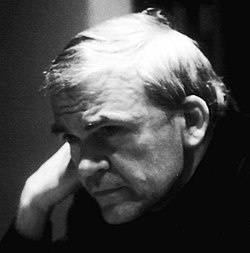Milan Kundera Quote
Tereza keeps appearing before my eyes. I see her sitting on the stump petting Karenin’s head and ruminating on mankind’s debacles. Another image also comes to mind: Nietzsche leaving his hotel in Turin. Seeing a horse and a coachman beating it with a whip, Nietzsche went up to the horse and, before the coachman’s very eyes, put his arms around the horse’s neck and burst into tears.That took place in 1889, when Nietzsche, too, had removed himself from the world of people. In other words, it was at the time when his mental illness had just erupted. But for that very reason I feel his gesture has broad implications: Nietzsche was trying to apologize to the horse for Descartes. His lunacy (that is, his final break with mankind) began at the very moment he burst into tears over the horse.And that is the Nietzsche I love, just as I love Tereza with the mortally ill dog resting his head on her lap. I see them one next to the other: both stepping down from the road along which mankind, the master and proprietor of nature, marches onward.
Tereza keeps appearing before my eyes. I see her sitting on the stump petting Karenin’s head and ruminating on mankind’s debacles. Another image also comes to mind: Nietzsche leaving his hotel in Turin. Seeing a horse and a coachman beating it with a whip, Nietzsche went up to the horse and, before the coachman’s very eyes, put his arms around the horse’s neck and burst into tears.That took place in 1889, when Nietzsche, too, had removed himself from the world of people. In other words, it was at the time when his mental illness had just erupted. But for that very reason I feel his gesture has broad implications: Nietzsche was trying to apologize to the horse for Descartes. His lunacy (that is, his final break with mankind) began at the very moment he burst into tears over the horse.And that is the Nietzsche I love, just as I love Tereza with the mortally ill dog resting his head on her lap. I see them one next to the other: both stepping down from the road along which mankind, the master and proprietor of nature, marches onward.
Related Quotes
About Milan Kundera
Kundera's best-known work is The Unbearable Lightness of Being. Before the Velvet Revolution of 1989, the country's ruling Communist Party of Czechoslovakia banned his books. He led a low-profile life and rarely spoke to the media. He was thought to be a contender for the Nobel Prize in Literature and was also a nominee for other awards.
Kundera was awarded the Jerusalem Prize in 1985, the Austrian State Prize for European Literature in 1987, and the Herder Prize in 2000. In 2021, he received the Golden Order of Merit from the president of Slovenia, Borut Pahor.
